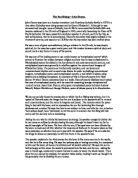Donne again challenges the sun to "Look, and tomorrow late, tell me whether both the Indias of spice and mine be where thou leftst them, or lie here with me. Ask for those kings whom thou saw'st yesterday, and thou shalt hear: "All here in one bed lay"." The two Indias, East containing spices and West containing gold, the most precious items ever known, and all the kings of the world would be found lying in bed with him. He proudly explains that this wealth is found in the woman lying next to him. By personifying the worlds' riches as his lover, Donne shows how much his treasures and values her, though appears to be arrogant and all too confident.
The hyperbole is exaggerated even further in the final stanza, and once more declares his love the most powerful experience in the world. The sun's authority in the world is rebuked as Donne proclaims "She is all states, and all princes I." Despite realisations of the time that the sun was in fact at the center of the universe; he claims that their love has put them back into the center. The lover is every country in the world, he rules over her and nothing else is more important. "Nothing else is."
The princes of the world "do but play us" - merely try to imitate them, and what people consider significant in their lives - honour and wealth are only "mimic" and "alchemy"; trivial and perishable things.
To conclude, Donne makes the greatest assertion of all, that is, his bed is in fact the world. Therefore, all the sun needs to do in his old age is to "Shine here to us, and thou art everywhere; This bed thy center is, these walls, thy sphere." The sun needs only to warm Donne and his lover, as everything which mattered in the world (to him) was already lying beside him.
In 'Funeral Blues' the speaker mourns for a deceased loved one and again there is a sense of progression in the exaggeration of imagery when expressing love lost and sorrow. The speaker talks of everything in the world coming into an end after the lover has died, but there is bathos throughout the imagery as it alternates from a serious matter to something more lighthearted.
For example in the first stanza, the speaker describes things people do personally to deal with grief: "stop all the clocks, cut off the telephone" However the next line clashes, with "prevent the dog from barking with a juicy bone" and here we are left with something less somber.
The speaker then wishes for more exceptional things to take place around him to share in his bereavement, "Let aeroplanes circle moaning overhead Scribbling on the sky the message He Is Dead."
'Moaning' personifies the sadness of the planes, and 'He Is Dead' in capitals leads the words to be read slowly, the emphasis almost sounding like an announcement to his town or city to mourn together.
There is again a sense of bathos in the next two lines, and along with the juxtaposition of words. "Put the crepe bows round the white necks of the public doves. Let the traffic policemen wear black cotton gloves." Firstly the images are absurd and the play of words appears with white instead of black crepe bows, and black instead of white cotton gloves. This creates a feeling that the speakers' world has turned upside down, that nothing in the world is right anymore.
In the third stanza the speaker directly expresses his/her love towards the deceased, "He was my North, my South, my East and West, my working week and my Sunday rest, my noon, my midnight, my talk, my song". This person meant everything to the speaker, filling every direction and time of day in life. However, "I thought that love would last forever: I was wrong" which blatantly expresses the disillusion the speaker has received.
After this the speaker does not even feel the need for the world anymore, that it too can stop and disappear. "The stars are not wanted now, put out every one; Pack up the moon and dismantle the sun; pour away the ocean and sweep up the wood." The actions used are very ordinary and light, however what they are used for are the creations of nature, and it shows the extent of the speakers' despair, though obviously an impossible task. The final line ends the poem in a depressed tone, the words (underlined) are used to make a determined point: "For nothing now can ever come to any good."
In 'The Sun Rising', Donne exaggerates the imagery and importance of his love affair to the world in an egotistical and somewhat overbearing way, which undoubtedly shows his love and devotion for this woman. He playfully believes that even a powerful natural force such as the sun is unable to hinder their love and the course of the world could change for lovers.
'Funeral Blues' again uses detailed imagery in a hyperbolic, progressive way yet the overall attitude of the poem is very different. Even though the poet uses extraordinary ideas and images and demands that the world stop its course for love, just like Donne in 'The Sun Rising' , Auden is rebuking the egotism used in his poem. By using bathos and the juxtaposition of words, he shows the reader that the universe is bigger than humans are. That life goes on for other people, and that the workings and joys of the world cannot be changed due to one person's grief, although inevitably they wish for it to be true.







